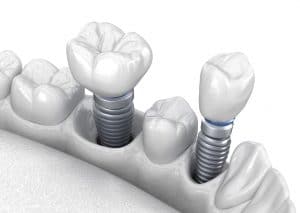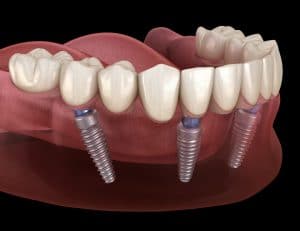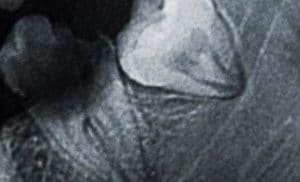 For most dental health concerns, undergoing the right customized dental treatment can alleviate the problem and stop it from getting worse so you can preserve your healthy smile. However, tooth loss is different than other oral health concerns in many ways. For instance, tooth loss doesn’t occur on its own, but is often a symptom of a serious underlying health concern or accidental trauma. Also, for many traditional dental prostheses, replacing the lost teeth doesn’t address all of the problems resulting from the loss. This means tooth loss can continue to impact your smile even after you’ve replaced them with a conventional bridge or denture, though you can prevent many of those impacts with the help of a dental implant-supported restoration. (more…)
For most dental health concerns, undergoing the right customized dental treatment can alleviate the problem and stop it from getting worse so you can preserve your healthy smile. However, tooth loss is different than other oral health concerns in many ways. For instance, tooth loss doesn’t occur on its own, but is often a symptom of a serious underlying health concern or accidental trauma. Also, for many traditional dental prostheses, replacing the lost teeth doesn’t address all of the problems resulting from the loss. This means tooth loss can continue to impact your smile even after you’ve replaced them with a conventional bridge or denture, though you can prevent many of those impacts with the help of a dental implant-supported restoration. (more…)
What Does Oral Health Have to Do with Systemic Health?
 There are simple steps to keeping your smile consistently healthy, such as brushing your teeth twice and flossing at least once every day, as well as visiting your general dentist routinely for preventive checkups and cleanings. In some cases, maintaining your good oral health may be more complex, and more involved treatment may be required to address a problem that has developed. In any case, the benefits that come with consistently maintaining your good oral health can often be more profound than many people realize. Today, we examine the connection between your oral health and systemic health, and why a healthy smile matters to your physical wellbeing. (more…)
There are simple steps to keeping your smile consistently healthy, such as brushing your teeth twice and flossing at least once every day, as well as visiting your general dentist routinely for preventive checkups and cleanings. In some cases, maintaining your good oral health may be more complex, and more involved treatment may be required to address a problem that has developed. In any case, the benefits that come with consistently maintaining your good oral health can often be more profound than many people realize. Today, we examine the connection between your oral health and systemic health, and why a healthy smile matters to your physical wellbeing. (more…)
Why Is Extraction Common for Wisdom Teeth?
 While healthy, natural adult teeth are capable of lasting a lifetime with the right care and maintenance, some teeth may face problems during their growth and development that can compromised that capability. Wisdom teeth, or third molars, are among the most common types of teeth to develop such problems, such as becoming impacted due to insufficient space at the ends of many people’s dental ridges. Because of the problems that this impaction can cause, wisdom teeth are also one of the most commonly extracted types of teeth. (more…)
While healthy, natural adult teeth are capable of lasting a lifetime with the right care and maintenance, some teeth may face problems during their growth and development that can compromised that capability. Wisdom teeth, or third molars, are among the most common types of teeth to develop such problems, such as becoming impacted due to insufficient space at the ends of many people’s dental ridges. Because of the problems that this impaction can cause, wisdom teeth are also one of the most commonly extracted types of teeth. (more…)
Could Oral Surgery Be the Answer to These Concerns?
 Oral health treatments that involve surgery are not typically recommended for general dental health concerns. For example, some of the most common problems, such as tooth decay and gum disease, can usually be managed with minimally invasive treatment at a general dentist’s office. However, there are some conditions that could potentially affect most people to a degree that requires oral surgery to recover from. When it’s recommended, the right conservative oral surgery treatment could be the most effective way to help you regain your healthy and fully functional smile. (more…)
Oral health treatments that involve surgery are not typically recommended for general dental health concerns. For example, some of the most common problems, such as tooth decay and gum disease, can usually be managed with minimally invasive treatment at a general dentist’s office. However, there are some conditions that could potentially affect most people to a degree that requires oral surgery to recover from. When it’s recommended, the right conservative oral surgery treatment could be the most effective way to help you regain your healthy and fully functional smile. (more…)
Factors that Impact Your Dental Implant Placement
 Restoring your smile after experiencing tooth loss is important to your long-term oral health, and in many cases, dental implants offer the most comprehensive benefits for doing so. That’s largely thanks to their ability to replace your lost teeth roots, which play several intricate roles in your oral health and bite function. However, there are several factors that might affect your ability to receive dental implants right away, many of which involve the health and integrity of your other oral tissues and structures. (more…)
Restoring your smile after experiencing tooth loss is important to your long-term oral health, and in many cases, dental implants offer the most comprehensive benefits for doing so. That’s largely thanks to their ability to replace your lost teeth roots, which play several intricate roles in your oral health and bite function. However, there are several factors that might affect your ability to receive dental implants right away, many of which involve the health and integrity of your other oral tissues and structures. (more…)
Can a Denture Be Supported by Only Four Dental Implants?
 For patients who experience complete tooth loss on their upper or lower dental ridge, a full, custom-designed implant denture is often the a lifeline to restoring their bite function, their smile’s appearance, and a large part of their overall quality of life. Yet, the extent of their tooth loss can sometimes make receiving dental implants an equally extensive process, especially in the process of rebuilding the entire dental ridge. Fortunately, many patients can benefit from the support of dental implants and the full restoration of their dental ridge, all with more minimally invasive treatment than they may expect. With All-on-4 implant dentures, we may be able to support your complete denture on just four strategically placed dental implant posts. (more…)
For patients who experience complete tooth loss on their upper or lower dental ridge, a full, custom-designed implant denture is often the a lifeline to restoring their bite function, their smile’s appearance, and a large part of their overall quality of life. Yet, the extent of their tooth loss can sometimes make receiving dental implants an equally extensive process, especially in the process of rebuilding the entire dental ridge. Fortunately, many patients can benefit from the support of dental implants and the full restoration of their dental ridge, all with more minimally invasive treatment than they may expect. With All-on-4 implant dentures, we may be able to support your complete denture on just four strategically placed dental implant posts. (more…)
Why Isn’t Extracting Teeth More Frequently Recommended?
 There are many options for addressing a wide range of oral health problems, and most are designed specifically to help you preserve as much of your healthy, natural tooth structure as possible. However, in some cases, extracting a tooth is the preferable solution for your oral health, depending on the severity of your oral health concern. The reason tooth extraction isn’t more frequently recommended is because it involves removing all of your tooth’s structure and, in many cases, replacing it. However, when it is recommended, it’s important to seek treatment to restore your smile as soon as possible. (more…)
There are many options for addressing a wide range of oral health problems, and most are designed specifically to help you preserve as much of your healthy, natural tooth structure as possible. However, in some cases, extracting a tooth is the preferable solution for your oral health, depending on the severity of your oral health concern. The reason tooth extraction isn’t more frequently recommended is because it involves removing all of your tooth’s structure and, in many cases, replacing it. However, when it is recommended, it’s important to seek treatment to restore your smile as soon as possible. (more…)
What Smile Restoration Means After Tooth Loss
 When it comes to restoring a tooth that’s compromised in some way, the goal is to help the tooth regain its function and preserve what remains of its healthy, natural structure. However, when a tooth is lost or extracted, that’s no longer possible, and restoring your smile depends on replacing the tooth in order to restore its proper function. This means the more lifelike your dental prosthesis is, the better job it can do of restoring your smile. That’s also why dental implants often make the ideal solution for replacing one or more lost teeth. (more…)
When it comes to restoring a tooth that’s compromised in some way, the goal is to help the tooth regain its function and preserve what remains of its healthy, natural structure. However, when a tooth is lost or extracted, that’s no longer possible, and restoring your smile depends on replacing the tooth in order to restore its proper function. This means the more lifelike your dental prosthesis is, the better job it can do of restoring your smile. That’s also why dental implants often make the ideal solution for replacing one or more lost teeth. (more…)
What It Means When a Wisdom Tooth Gets Impacted
 Wisdom tooth impaction isn’t as common as many other oral health concerns, but when it occurs, it can become a serious threat and source of discomfort to your oral health. Unless you’ve already experienced it, the condition may seem like a mystery, and fortunately, there may be a chance that you’ll never have to deal with a problematic wisdom tooth. However, if you do, then it’s important to understand what the condition means, and why extracting impacted wisdom teeth as soon as possible is important to your immediate and long-term oral health. (more…)
Wisdom tooth impaction isn’t as common as many other oral health concerns, but when it occurs, it can become a serious threat and source of discomfort to your oral health. Unless you’ve already experienced it, the condition may seem like a mystery, and fortunately, there may be a chance that you’ll never have to deal with a problematic wisdom tooth. However, if you do, then it’s important to understand what the condition means, and why extracting impacted wisdom teeth as soon as possible is important to your immediate and long-term oral health. (more…)
How to Recover from the Effects of Tooth Loss
 With the right general dental care, your smile can recover from many of the conditions that could impact its health and integrity, including those that have reached a more severe stage. For example, restoring a significantly fractured or broken tooth, successfully stopping and managing gum disease, and more can often help a smile fully or almost fully recover its good health and integrity. Yet, after losing a tooth, there are many different effects the loss can have on your smile and oral health. Recovering from these effects may require replacing more than just the visible part of the tooth, but also its root in order to fully restore the tooth’s vital role in your long-term oral health. (more…)
With the right general dental care, your smile can recover from many of the conditions that could impact its health and integrity, including those that have reached a more severe stage. For example, restoring a significantly fractured or broken tooth, successfully stopping and managing gum disease, and more can often help a smile fully or almost fully recover its good health and integrity. Yet, after losing a tooth, there are many different effects the loss can have on your smile and oral health. Recovering from these effects may require replacing more than just the visible part of the tooth, but also its root in order to fully restore the tooth’s vital role in your long-term oral health. (more…)


